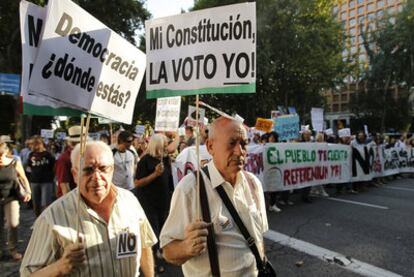Referendum demands over deficit cap gather pace online and in street
But some constitutional experts say initiative does not require popular backing
Last Tuesday, José Luis Rodríguez Zapatero surprised everyone by announcing he had negotiated a constitutional reform with the opposition Popular Party (PP) to introduce the notion of budget stability, with the goal of placing a ceiling on the public deficit. Since then, all the major parties have been working at breakneck speed to negotiate a text that will be up for debate at Wednesday's plenary session. The reform crudely underscores two of the most enduring "traditions" in Spanish political law: a reticence to touch the Constitution, and the lack of a referendum tradition.
The aversion to changing the Constitution in any way is in contrast to the relative ease with which other European countries bring their basic norms up to speed. "In Spain, our tradition in terms of constitutional reform consists of no reforms at all. Thus, if you want to change the Constitution, you just go ahead and get yourself a whole new Constitution, and that's a very bad tradition," says Roberto Blanco, professor of constitutional law at Santiago de Compostela University, summing up the feeling of other colleagues consulted by EL PAÍS.
The second Spanish custom highlighted by the current initiative is the lack of familiarity with popular referendums, something we share with most Western democracies- except for Switzerland, which has its own exotic rules when it comes to political organization- and a few US states such as California. However, the fact that constitutional reform of the spending ceiling is being requested through the ordinary proceedings set forth in Article 167, which excludes a popular poll unless 10 percent of deputies or senators request one, has sent the minority left-wing parties on the war path. It has also triggered a significant protest movement on the internet.
By the end of last weekend, 82,177 people had signed a petition to demand that the speakers of the parliamentary groups in Congress and the Senate force a referendum. The initiative (available at www.actuable.es) is led by Vicenç Navarro, a professor of political and social science at Pompeu Fabra University, who says that "Spanish democracy is one of the least participatory in the European Union." He also calls upon the 15-M grassroots protest movement to back the initiative for a referendum on the issue. Around 3,000 people demonstrated in Madrid on Sunday demanding a popular consultation.
Meanwhile, scholars are divided about the advisability of including spending limits in the Constitution, and about the express formula being used to do so. Yet everyone agrees that this is "a very technical" issue that "in principle" does not require a referendum. Gregorio Peces-Barba, a professor of philosophy of law at Carlos III University and one of the seven "founding fathers" of the 1978 Constitution, said he was in favor of the reform and cthat "there is not much sense in turning circles around something that a sufficient majority already agrees on."
Javier Pérez Royo, a professor of constitutional law at Seville University, agreed. To him, the reform "is not a reform per se but a constitutionalization of a situation of economic emergency." He thinks that the timeframes for calling and holding a referendum would mean "a certain contradiction" with a measure that is meant to be urgent. "Let's say there is a referendum and "no" wins. We'd send out the strongest counter-message we possibly could. If that happened, I don't even want to imagine what kind of risk premium Spain would face to sell its sovereign debt."

Tu suscripción se está usando en otro dispositivo
¿Quieres añadir otro usuario a tu suscripción?
Si continúas leyendo en este dispositivo, no se podrá leer en el otro.
FlechaTu suscripción se está usando en otro dispositivo y solo puedes acceder a EL PAÍS desde un dispositivo a la vez.
Si quieres compartir tu cuenta, cambia tu suscripción a la modalidad Premium, así podrás añadir otro usuario. Cada uno accederá con su propia cuenta de email, lo que os permitirá personalizar vuestra experiencia en EL PAÍS.
En el caso de no saber quién está usando tu cuenta, te recomendamos cambiar tu contraseña aquí.
Si decides continuar compartiendo tu cuenta, este mensaje se mostrará en tu dispositivo y en el de la otra persona que está usando tu cuenta de forma indefinida, afectando a tu experiencia de lectura. Puedes consultar aquí los términos y condiciones de la suscripción digital.








































